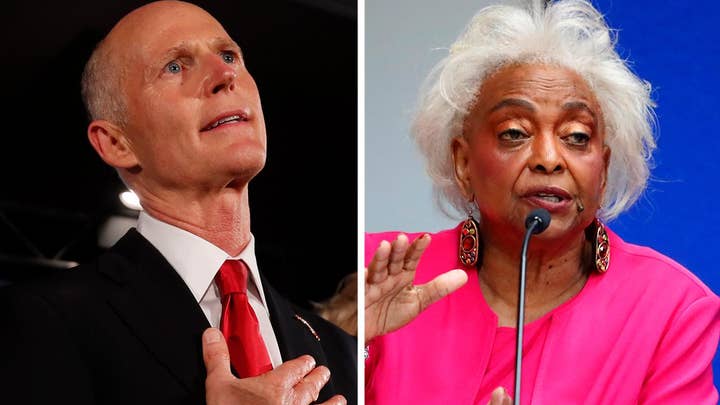Lawsuits, missed deadline and no declared winners in Florida
The recount deadline comes and goes in Florida: Are we any closer to learning who won the Sunshine State's Senate and governor's races? Peter Doocy reports from Lauderhill, Florida.
As the recount battle drags on in Florida, data shows such events have been rare since the turn of the century and are unlikely to change the outcome – but if they do, Democrats always win.
A 2016 survey by FairVote, a nonpartisan group focusing on elections, found that out of 4,687 statewide general elections between 2000 and 2015, only 27 races had recounts and just 15 of them were deemed “consequential” as the original victory margins were 0.15 percent or less.
Even rarer than recounts are actual result reversals. Just three recounts led to such an occurrence, or one out every 1,562 statewide elections.
The three reversals include the 2008 U.S. Senate race in Minnesota in which Democrat Al Franken defeated Republican Norm Coleman; the 2006 auditor's race in Vermont, and the 2004 governor's race in Washington.
In all three cases, Democrats initially lost the elections, eventually came out on top following the recount.
The three result reversals include the 2008 U.S. Senate race in Minnesota in which Democrat Al Franken defeated Republican Norm Coleman; the 2006 auditor's race in Vermont, and the 2004 governor's race in Washington. In all three cases, Democrats initially lost the elections, but following the recount they came out on top.
Marc Elias, from Seattle-based law firm Perkins Coie who was behind the salacious anti-Trump dossier and is currently leading recount efforts on behalf of the Democrats, was part of legal teams that reversed the results in two of those races.
CLINTON CAMPAIGN LAWYER WITH TIES TO TRUMP DOSSIER LEADS DEMOCRAT RECOUNT EFFORT IN FLORIDA
The lawyer’s participation in Florida election prompted a tweet from President Trump, who called him Democrats’ “best Election stealing lawyer.”
“As soon as Democrats sent their best Election stealing lawyer, Marc Elias, to Broward County they miraculously started finding Democrat votes. Don’t worry, Florida - I am sending much better lawyers to expose the FRAUD!” the president tweeted.
Still, few result reversals can be attributed to the fact that that recounts barely shift the margins. The data indicated that the statewide recounts led to an average margin swing of 282 votes between the frontrunners.
This is a troubling statistic for Nelson in Florida who hopes the manual recount ordered on Thursday could overturn Scott’s lead of just over 12,500 votes and continue to occupy the U.S. Senate seat he held for years.
Nelson campaign is staking the election on the so-called undervotes or uncounted votes where an automated vote scanner couldn’t detect a vote for any candidate. A manual recount by hand could help clarify the ballot and cast a vote for one of the candidates.
FLORIDA RECOUNT: FURY AT BROWARD, PALM BEACH, FOR MAKING REST OF STATE LOOK LIKE 'LAUGHING STOCK'
The uncounted votes were the subject of a controversy of their own, in particular at Broward County, where the total number of votes cast changed multiple times after the election, each time decreasing Scott’s lead.
“Late Tuesday night, our win was projected to be around 57,000 votes," Scott told reporters last week. "By Wednesday morning, that lead dropped to 38,000. By Wednesday evening, it was around 30,000. This morning, it was around 21,000. Now, it is 15,000."
He added: “On election night, Broward County said there were 634,000 votes cast. At 1 a.m. today, there were 695,700 ballots cast on election day. At 2:30 p.m. today, the number was up to 707,223 ballots cast on Election Day. And we just learned, that the number has increased to 712,840 ballots cast on Election Day. In Palm Beach County, there are 15,000 new votes found since election night.”
Democratic governor hopeful Andrew Gillum also tried to force the manual recount amid the initial election loss to Republican Ron DeSantis. While Gillum is continuing his advocacy to count every vote, the governor's race won’t have a manual recount because DeSantis is holding a 33,683-vote lead, a margin of 0.41 percent, and therefore the race doesn’t qualify for a manual recount.
Recounts also come at a cost to the taxpayers, with some races in the past costing more than $1 million to the treasury.
The Pew Charitable Trusts, an independent aimed at improving public policy, found in 2010 that the 2004 gubernatorial recount cost nearly $1.12 million, while the Minnesota Senate race came at a cost of $460,000, with around 15 cents per ballot.
It remains unclear how much the recount in Florida will cost. In 2000, Citizens Against Government Waste released a report that estimated the costs associated with the state’s recount efforts.
The group estimated Palm Beach County blew through $25,000 a day and projected the 2000 recount cost in Broward, Miami-Dade and Palm Beach counties to be more than $2 million.
























